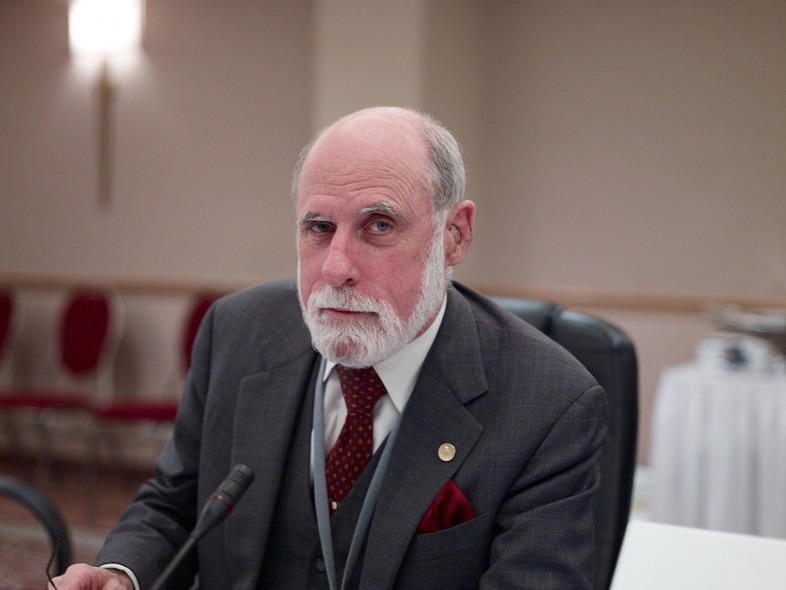Tech News
People who doubted Facebook

Have something to add to this story? Share it in the comments.
-

1. Vint Cerf
The Google vice president and chief evangelist said in 2011 that Facebook would go the way of AOL. Yup, the man nicknamed the “Father of the Internet” said the site was becoming a “closed walled garden” and would fail to keep up with audiences.
Image: Flickr, Joi Ito -
2. Warren Buffett
When Facebook held its IPO in 2012, record numbers lined up to buy in to the social media giant – but Warren Buffett wasn’t one of them. The billionaire and his business partner, Charlie Munger, avoided it, and actually advised people against the decision.
Buffett didn’t deny that Facebook could have a brilliant future, but admitted, “I just don’t know.” During an interview with CNBC, he said, “I’m an agnostic on a company like Facebook…it’s obviously an extraordinary business, but they’re the hardest ones to value, because the question is whether five or 10 years from now that they will be as extraordinary as they are now.”
Video: YouTube, WarrenBuffettBlog -

3. Charlie Munger
Munger, on the other hand, was a bit more acidic in an interview with CNN.
“I don’t invest in what I don’t understand. And I don’t want to understand Facebook,” Munger said. “I don’t want people putting all this personal stuff into a permanent record when they are 15 years of age. I think it’s counterproductive…I just basically don’t like it.”
Image: Flickr, Nick Webb -

4. Evan Spiegel
An air of drama has always surrounded the Snapchat CEO. Zuckerberg sensed Snapchat’s potential, however, and offered to buy the company for $3 billion cash. Spiegel refused the offer.
“I think trading that for some short-term gain isn’t very interesting,” he told Forbes.
Image: Flickr, TechCrunch -

5. Sean Parker
In a lengthy article for TechCrunch, Sean Parker (former president of Facebook and founder of Napster) communicated his dislike for the social media movement. (According to Parker, the press relentlessly covered his wedding to Alexandra Lens, due to its hefty price tag and lavish decor.)
Though he mainly directed his article toward journalists, Parker shared personal opinions about the world of oversharing.
While he doesn’t anticipate Facebook will sink as a company, he believes its creation prompted a seismic shift in journalism. He says people “will experience a violation of their privacy, will find their reputation besmirched publicly, and may even find their sanity challenged.”
“By some process of karmic retribution, the mediums I dedicated my life to building have all too often become the very weapon by which my own character and reputation has been mercilessly attacked in public,” he wrote.
Image: Flickr, Andrew Mager -

6. Alexis Ohanian
Reddit cofounder Alex Ohanian had some very strong words about Facebook’s IPO:
“If Facebook continues to make bad decisions about user experience — about disrespecting privacy — you have the potential for this to become something like the social networking fads of yesteryear,” Ohanian told Shira Lazar. “The value of a site that is community-driven is in the community. … My concern is, if Facebook continues to make bad decisions for the community, those could mean bad things for the business.”Image: Flickr, Ketchum PR -

7. Aaron Sorkin
Famed Hollywood writer Aaron Sorkin nabbed his first Academy Award for penning The Social Network script, a dramatization about the founding of Facebook.
While promoting the film on talk show The View, he said, “It’s a device that’s meant to connect us, to bring us closer together. I think, and I know I’m in the minority, at minimum there are 500 million people who disagree with me, I think it’s pushing us further apart…I think socializing on the Internet is to socializing what reality TV is to reality.”
While he admitted it could positively impact people’s lives, he didn’t relent on the wider negative effect.
Image: ABC/The View -
8. Mark Zuckerberg
Back in the site’s early days, Facebook was a fledgling startup that catered to college kids on a handful of campuses.
In a 2005 interview, then 21-year-old Mark Zuckerberg was asked about the future of Facebook, but struggled to see how it could get any bigger.
“There doesn’t necessarily have to be more,” he said. “There is a level of service that we could provide when we were just at Harvard that we can’t provide for all of the colleges, and there’s a level of service that we can provide when we’re a college network that we wouldn’t be able to provide if we went to other types of things.”
Oh, to be young and unaware that you’re about to be a billionaire.
source:http://mashable.com/2014/02/04/facebook-future/#_

